
Trying to find elite remote talent can feel like panning for gold in a river of mediocre résumés. You post a job, and within hours, your inbox is a disaster zone filled with applicants who clearly didn't read the description. Hope you enjoy spending your afternoons fact-checking credentials and running technical interviews, because that’s now your full-time job. Or, you could skip that entire mess.
This isn't another generic list of job boards. We've been in the trenches and tested the platforms that promise the world. Turns out there’s more than one way to hire elite developers without mortgaging your office ping-pong table. We've sorted through the noise to find the best job recruiters for remote work that actually deliver pre-vetted, high-quality candidates. Forget the endless scrolling and the unqualified maybes. We’re talking about platforms and agencies that specialize in finding the exact talent you need, so you can focus on building your business instead of building a candidate pipeline from scratch.
Each breakdown includes direct links, screenshots, and an honest look at what they do best (and where they fall short). We’ll give you the insider perspective to help you decide which service is right for your budget, hiring needs, and company culture. Of course, hiring is just the first step. For a deep dive into what comes next, check out these strategies for managing remote teams effectively. Now, let's find your next great hire.
Let’s get one thing straight: hiring internationally sounds great until you’re knee-deep in compliance paperwork and time-zone-induced migraines. LatHire aims to solve this by focusing exclusively on the Latin American talent pool, a region teeming with skilled, cost-effective professionals who often share US business hours. This isn't just another job board; it's a full-stack platform designed to handle the messy parts of global hiring for you.
What makes LatHire stand out is its aggressive integration of AI. Instead of you spending weeks sifting through resumes, their system vets and matches candidates for roles in software development, design, marketing, and more. It’s one of the few job recruiters for remote work that moves beyond simple keyword matching to assess skills and cultural fit algorithmically. (Toot, toot! We’re not saying we’re perfect. Just more accurate more often.)
LatHire operates on a simple, three-step model that feels less like traditional recruiting and more like ordering a custom-built team.
Insider Tip: Be extremely specific in your initial job brief. The AI is powerful, but it's not a mind reader. The more detail you provide on required skills, tools, and even team culture, the more accurate the candidate matching will be.
LatHire is a solid fit for US and European companies, particularly tech startups and SMEs, looking to scale their teams without the astronomical costs of local talent. If you need to hire skilled developers, designers, or marketers and want to avoid the administrative overhead of global employment, this platform was built for you.
If you’ve been in the corporate world for more than a minute, you’ve heard of Robert Half. They’re the recruiting equivalent of a Fortune 500 company: massive, established, and surprisingly adaptive. While they built their empire on in-person placements, they’ve pivoted hard into the remote and hybrid space, making them a formidable player for companies that want the backing of a major firm. This isn't a scrappy startup; it's a recruiting powerhouse with a deep network.
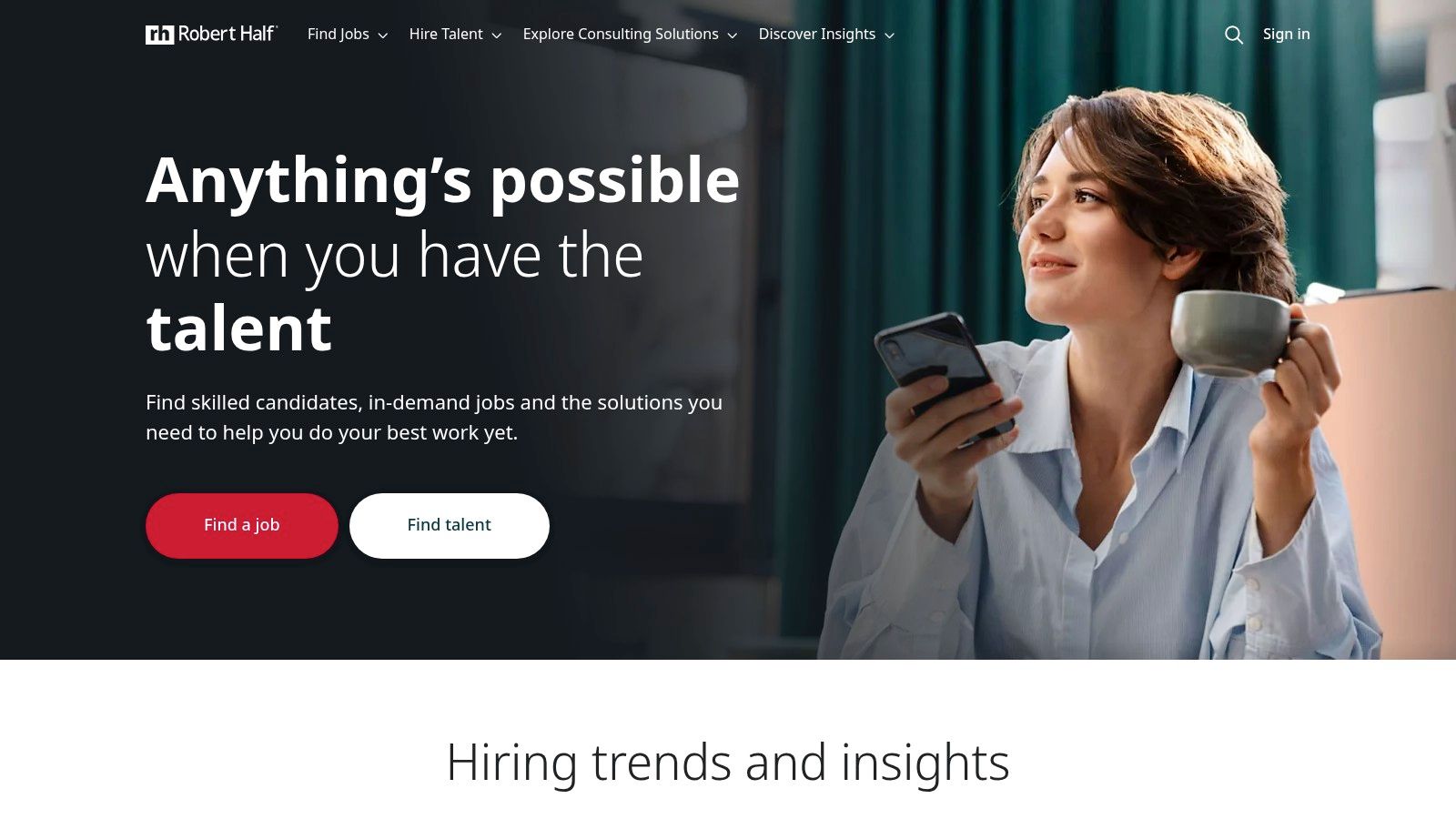
What makes Robert Half a compelling choice is its hybrid approach of tech and human touch. You get dedicated job recruiters for remote work who know your industry, backed by a platform with robust filtering and nationwide reach. They specialize in finance, accounting, tech, legal, and creative roles, offering a blend of temporary and permanent staffing solutions that smaller platforms can't match. Their established relationships with top companies mean they often have access to roles that aren't advertised elsewhere.
Robert Half’s process feels more traditional than AI-first platforms, but it’s a system refined over decades. It's less "submit and forget" and more "let's build a relationship."
Insider Tip: Leverage your recruiter as an industry consultant. They have real-time data on salary benchmarks and in-demand skills in your specific market. Ask them for insights beyond just the candidates they present; it can help you refine your job description and offer.
Robert Half is ideal for established U.S. companies that value a high-touch, relationship-based recruiting process and need to fill roles in core business functions like finance, legal, or tech. If you prefer working with a dedicated human expert over an algorithm and need the flexibility of both contract and permanent hires, this is a top contender. More details are available in this overview of the best remote recruiting companies.
If you think of corporate recruiting as a slow-moving cruise ship, Randstad is the aircraft carrier. It's one of the largest staffing firms globally, and that scale brings a massive, established network of employers. While many newer platforms focus on niche tech roles, Randstad covers the entire spectrum, from administrative and finance to healthcare and IT, making it a reliable giant in the world of job recruiters for remote work.
This isn't a slick, AI-driven startup; it’s a traditional recruiting firm that has successfully adapted to the remote work era. Their strength lies in their sheer volume of opportunities and the human touch of their recruiters, who often guide candidates through the hiring maze. For companies, it means access to a deep, diverse talent pool that has been vetted by seasoned professionals.
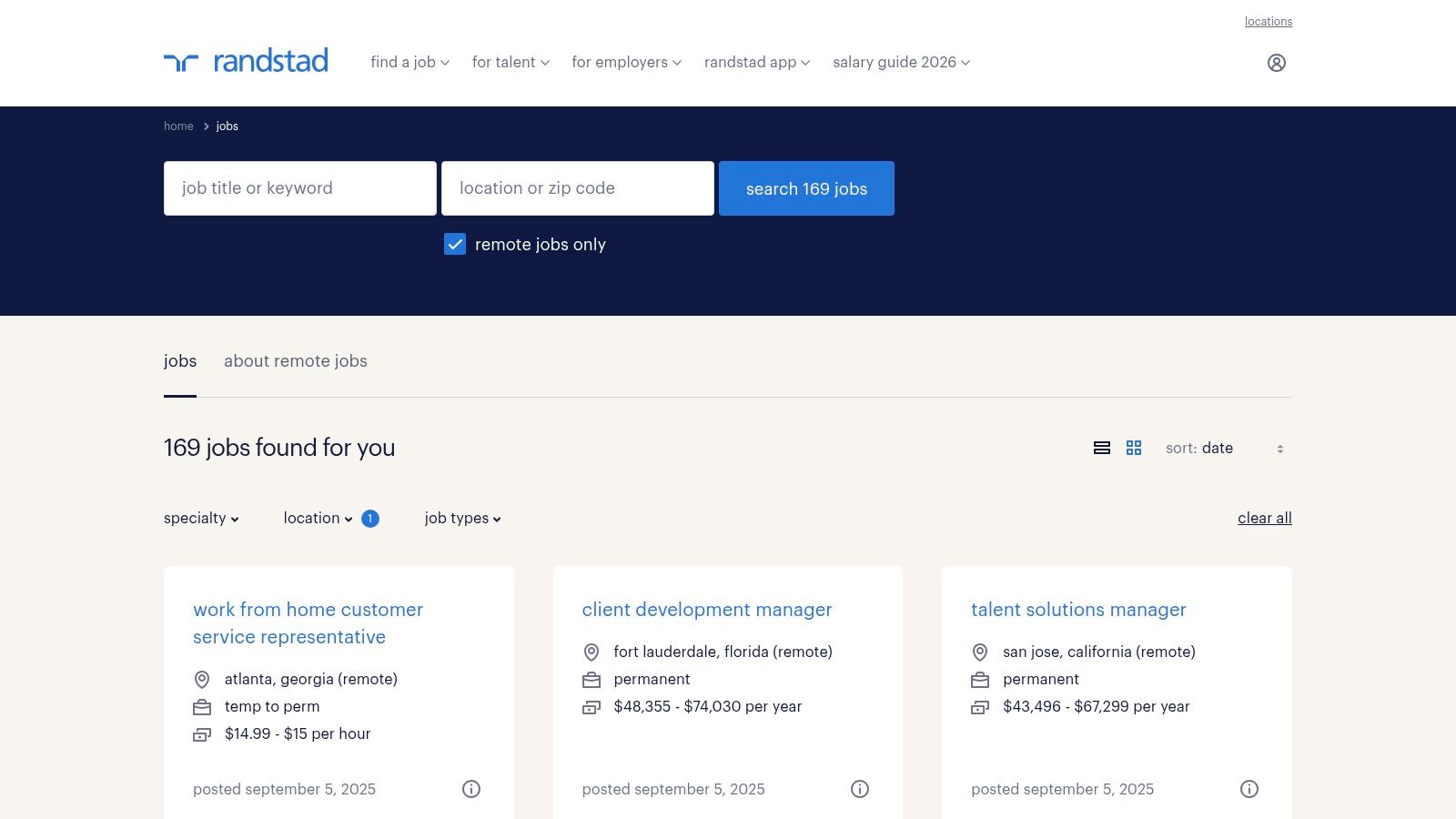
Randstad operates with a classic agency model, blending technology with personalized recruiter support. The process is straightforward for both job seekers and employers.
Insider Tip: Build a relationship with a specific Randstad recruiter. The experience can be inconsistent across teams, but a good recruiter will become your advocate, actively pitching you for roles that may not even be publicly listed yet.
Randstad is ideal for large enterprises and established companies looking to fill a wide range of remote positions, not just in tech. It's also a fantastic resource for professionals in traditional sectors (like HR, finance, and administration) seeking remote opportunities that are often scarce on tech-focused platforms.
If you’ve been in the professional world for more than a few years, you’ve probably heard of Kelly Services. This isn’t some flashy new startup; it’s a staffing behemoth that has adapted its massive infrastructure for the remote work era. Think of it as the established, reliable choice for companies that want recruiter-led placement without venturing into niche platforms. Their scale is their advantage, offering a huge volume of opportunities across the U.S.
What makes Kelly a key player is its organized approach to remote hiring, particularly through its KellyConnect program. They aren't just a job board where you post and pray. Instead, they act as one of the most hands-on job recruiters for remote work, connecting pre-vetted American talent to national clients for roles in science, engineering, education, and especially high-volume contact center positions. For many roles, Kelly acts as the employer of record, simplifying W-2 employment for contract gigs.
Kelly streamlines the hiring process by leveraging its legacy as a traditional staffing agency, but with a modern, remote-first focus. The process is guided by their recruiters from start to finish.
Insider Tip: Be aware that many of Kelly's remote positions have state-specific residency requirements due to tax and employment laws. Clarify this with your recruiter upfront to ensure your candidate pool isn't unnecessarily restricted.
Kelly is ideal for U.S.-based companies looking to fill a wide range of remote roles, from professional and technical positions to large-scale customer support teams. If you prefer a traditional, recruiter-managed process and need to hire W-2 contractors within the United States, Kelly’s established framework is a safe bet. It's a different approach than hiring abroad, a topic you can explore in more detail when considering global talent.
Finding a great creative or marketing contractor is one thing; finding one who gets amazing benefits is practically unheard of. Aquent crashes that party by specializing in high-end creative, marketing, and design talent, and then treating them like full-time employees. This isn't your typical gig marketplace; it's a curated staffing agency that offers W-2 employment for hourly workers.
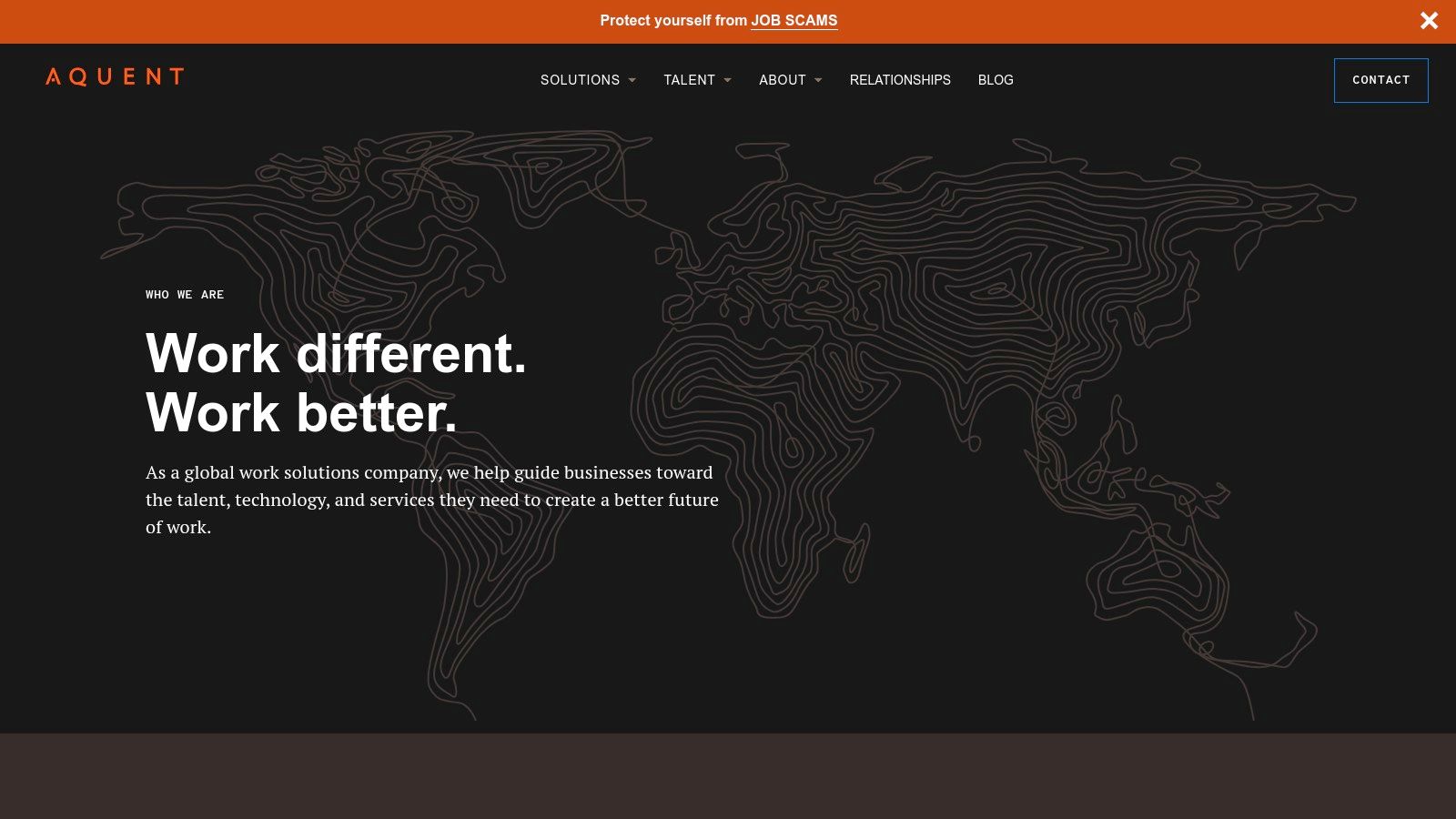
What makes Aquent a standout among job recruiters for remote work is its focus on talent welfare. By providing subsidized health insurance, paid sick leave, and a 401(k) match, they attract and retain top-tier professionals who are often forced to choose between freelance freedom and corporate stability. For companies, this means access to a more dedicated, motivated, and stable talent pool.
Aquent combines a user-friendly job board with the high-touch support of a traditional recruiting firm, making the hiring process smooth for both sides.
Insider Tip: When posting a role, clearly define whether it is fully remote, requires time-zone alignment, or has occasional on-site expectations. Top candidates value transparency, and being upfront about these details will attract the right applicants from the start.
Aquent is the perfect partner for marketing agencies, corporate design departments, and any company needing skilled creative or digital professionals for contract, contract-to-hire, or permanent roles. If you're tired of the typical freelance marketplace chaos and want to work with vetted, benefit-supported talent, this is your platform.
Sometimes you don’t want a disruptive tech platform; you want a global powerhouse with decades of recruiting experience. Michael Page is one of the giants in the recruitment world, and while they're known for traditional placements, their U.S. branch has carved out a dedicated space for remote work that’s surprisingly transparent and effective. They bring the rigor of executive search to the remote job market.
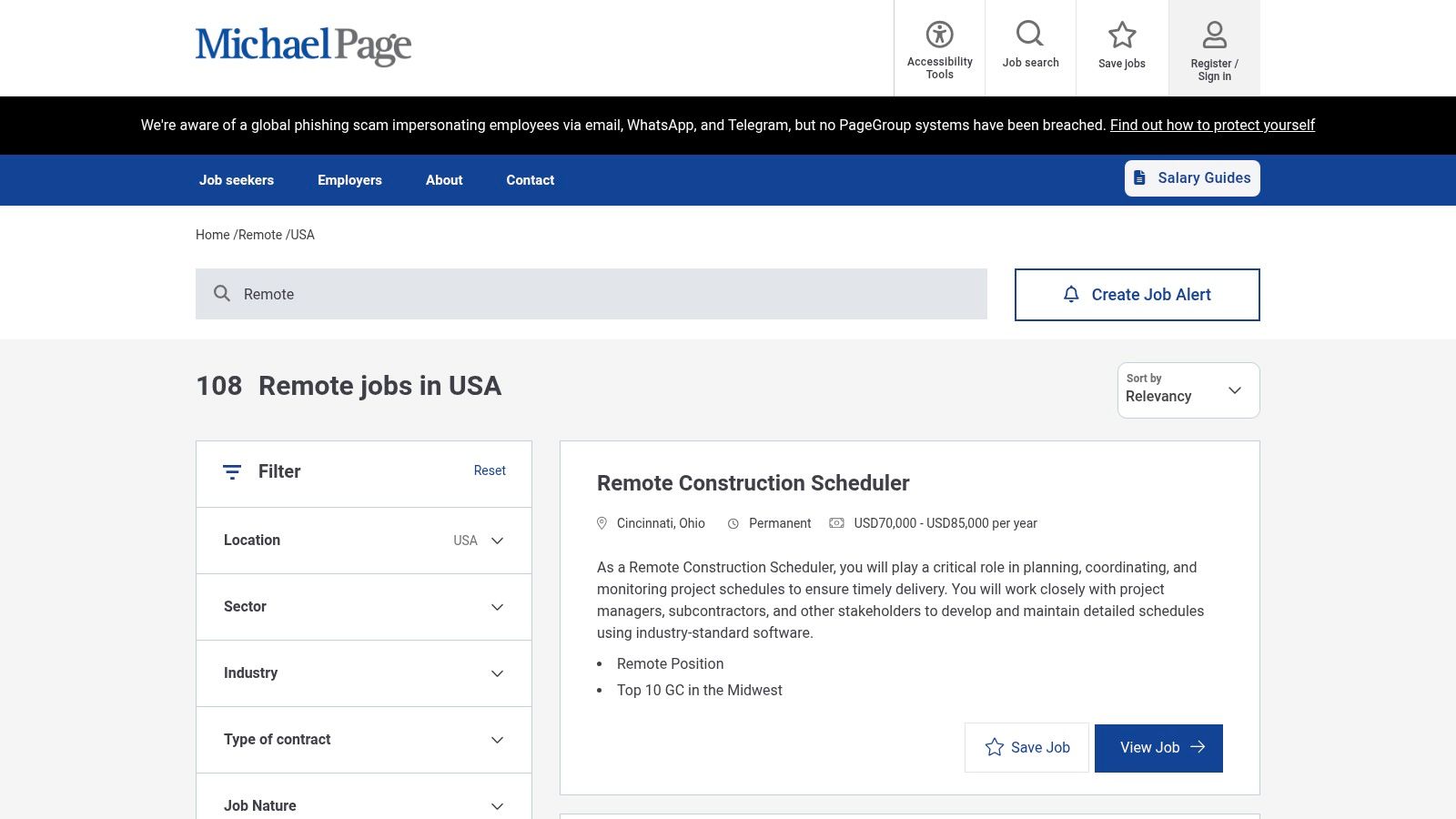
What makes Michael Page different is its human-centric, recruiter-led approach combined with a commitment to salary transparency. You won’t be dealing with an algorithm. Instead, you get a dedicated consultant who understands your industry, whether it's finance, life sciences, or supply chain. They are one of the few traditional job recruiters for remote work that puts salary ranges front and center on many listings, cutting through the usual hiring games.
Working with Michael Page feels less like posting on a job board and more like retaining a specialized headhunter for your remote roles. The process is managed and curated from start to finish.
Insider Tip: Leverage their recruiters' market knowledge. Ask them about current salary benchmarks and in-demand skills for the remote roles you're hiring for. This insight can help you craft a more competitive offer and attract top-tier talent.
Michael Page is ideal for established companies looking to fill mid-to-senior level professional roles with experienced candidates. If your priority is finding high-caliber talent in sectors like finance, sales, construction, or operations and you value a hands-on, consultative process, this is a top contender. It’s less suited for startups seeking entry-level positions or rapid, high-volume hiring.
If you’ve ever tried to hire an "expert" freelancer from a massive marketplace only to receive work that looks like a middle school art project, Toptal is the antidote. They’ve built their entire brand on being exclusive, accepting only the top 3% of applicants who survive their grueling, multi-stage vetting process. This isn’t a place for bargain-bin hires; it's where you go when you need a senior-level pro to parachute in and solve a complex problem yesterday.
Toptal acts as one of the most elite job recruiters for remote work by focusing on quality over quantity. They connect businesses with a curated network of freelance software developers, designers, finance experts, project managers, and product managers. The model is high-touch, combining sophisticated matching with human expertise to ensure you get the right person for your mission-critical project, not just someone with the right keywords on their profile.
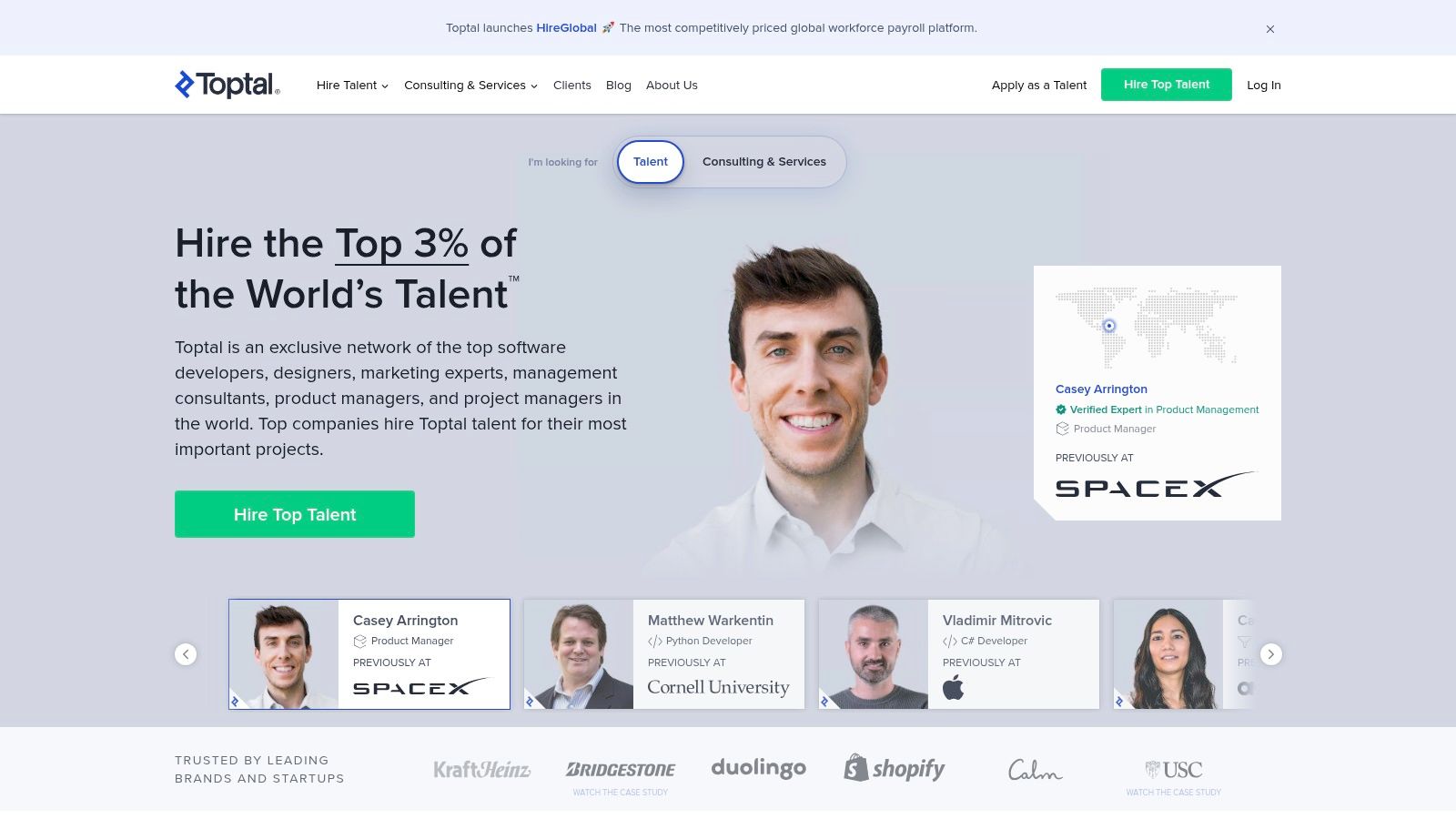
Toptal’s process is designed for speed and precision, cutting through the usual hiring noise to deliver vetted talent, fast.
Insider Tip: Treat your Toptal project brief like a surgical plan. The more specific you are about deliverables, tech stack, and team dynamics, the more effective their matchers will be. Don't just ask for a "Python developer"; ask for a "Senior Python developer with experience in Django, Celery, and deploying scalable microservices on AWS."
Toptal is ideal for established companies, well-funded startups, and enterprises that need to augment their teams with top-tier, specialized remote talent without the long-term commitment of a direct hire. If your project has a tight deadline, requires deep expertise, and you can’t afford to get it wrong, Toptal is a serious contender.
| Platform | Implementation Complexity | Resource Requirements | Expected Outcomes | Ideal Use Cases | Key Advantages |
|---|---|---|---|---|---|
| LatHire | Moderate (AI integration, compliance) | Dedicated budget for AI hiring platform and HR support | Fast, quality hires with cost savings up to 80% | US/Canada companies hiring vetted Latin American talent | Large pre-vetted talent pool; end-to-end payroll & compliance |
| Robert Half | Low (traditional staffing firm) | Minimal; relies on recruiter assistance | Access to diverse remote/hybrid roles nationwide | Candidates needing recruiter support across multiple sectors | National presence; salary transparency; flexible job types |
| Randstad USA | Low to moderate (standard recruitment) | Basic candidate tools plus recruiter support | Consistent remote job flow and broad industry access | Job seekers wanting varied contract and permanent remote roles | Large employer network; free candidate access |
| Kelly Services | Low (established staffing model) | Minimal candidate investment; recruiter guided | Remote placements primarily in science, engineering, and support | Candidates seeking remote W-2 contract roles with recruiter help | Extensive remote work programs; strong contact center pipeline |
| Aquent | Moderate (specialized recruiting) | Candidates require focus in creative/digital fields | Quality remote creative/marketing placements with benefits | Creative and digital professionals seeking subsidized benefits | Industry-leading benefits; specialized recruiters |
| Michael Page | Moderate (consultancy model) | Requires recruiter interaction | Transparent salary info and recruiter-led hiring | Mid-senior professionals in sales, finance, and life sciences | Salary transparency; broad professional roles |
| Toptal | High (stringent vetting, onboarding) | Higher budget for premium talent and client fees | Access to top 3% freelancers, fast scaling, trial projects | Companies needing vetted senior freelancers with flexible terms | Rigorous vetting; no-risk trial; premium talent quality |
We’ve just torn through a roster of the heavy hitters in remote recruiting. From the laser-focused tech specialists at Toptal to the global powerhouses like Randstad and Robert Half, it’s clear the talent landscape has permanently shifted. The days of posting a job on a generic board and praying for a unicorn are over. Hope is not a hiring strategy.
The core takeaway? Choosing a recruiting service isn’t about picking the one with the flashiest website or the lowest sticker price. It's about finding a genuine partner that understands your unique flavor of operational chaos. You're not just filling a seat; you're injecting a critical new cell into your company's DNA. The right partner acts like an extension of your team, not a glorified resume-forwarding service. They vet, they challenge, they understand that "proficient in JavaScript" means something very different for a seed-stage startup than it does for a Fortune 500 company.
So, where do you go from here? Don't just close this tab and go back to sifting through a mountain of LinkedIn profiles. It's time to make a decision.
Your Action Plan:
Define Your Deal-Breakers: Before you even think about booking a demo, get brutally honest about what you need. Is it speed? Niche technical skill? A specific budget? Write down your top three non-negotiables. This is your North Star.
Run a Small-Scale Test: You wouldn't buy a car without a test drive. Don't commit to a long-term recruiting contract without a trial run. Ask a potential partner to fill one, well-defined role. See how they communicate, the quality of candidates they present, and how they handle feedback. This small investment can save you from a very expensive mistake.
Ultimately, the best job recruiters for remote work are the ones who save you your most valuable asset: time. They take the 40-hour-a-week job of sourcing, screening, and scheduling off your plate, letting you focus on building your business. The right recruiter doesn't just find you a person; they find you the right person, turning a painful, drawn-out search into a strategic advantage. Now, go get your partner.
